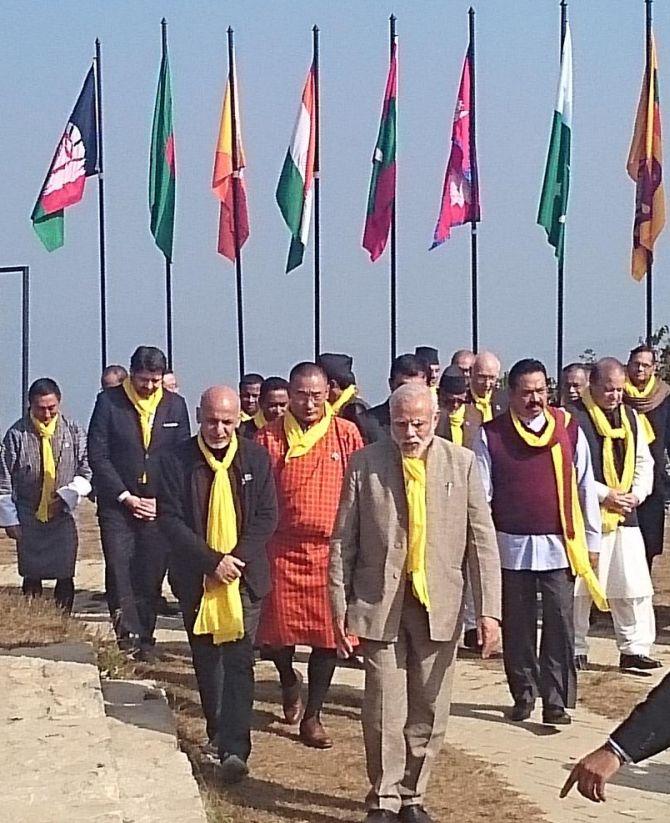India should encourage the second coming of SAARC with climate change as an urgent agenda and keeping Indian security concerns in mind as the subtext, suggest Lieutenant General Ashok Joshi (retd) and Colonel Anil A Athale (retd).

It is a universal truth that nature does not recognise political boundaries.
Yet, over the years the countries of South Asia or more correctly the Indian subcontinent, have been obsessed with political issues at the cost of other challenges like economic prosperity and threat posed by climate change.
Both the elites and masses in India's neighbourhood have been more concerned with the alleged 'Indian Threat' rather than the rise of sea levels, and the melting of Himalayan glaciers that threaten their very survival.
These issues can only be tackled with the help of India that is central to the region and has the resources to help.
India can and must take the lead and formulate a joint action plan to tackle these real threats.
But anti Indianism is so deeply ingrained in the neighbourhood that it will need a major change in mindset.
According to many international climate change studies, the Indian subcontinent is one of the regions that is most vulnerable to rising sea levels.
The Arctic and Antarctic ice is melting at an alarming rate due to warming of the earth.
Rising sea levels will pose a particularly severe threat to the Maldives that is only about a metre above the sea level.
Bangladesh is similarly prone to losing its land to the encroaching sea.
The rising salinity in the soil due to rising sea levels will affect agriculture in Bangladesh much before it actually loses its coastal areas to the sea.
Sri Lanka has seen the kind of damage that can occur during the tsunami of December 26,2004.
The effect of rising sea levels, mercifully, is not likely to happen suddenly, but over a period of time.
Pakistan on the other hand has a smaller coastline and is less vulnerable to rise in sea levels compared to islands or Bangladesh.
But Pakistan faces the prospect of water shortage and collapse of agriculture as the Himalayan glaciers retreat and shortage of water dents agricultural production.
Chinese initiated aggressive actions in Ladakh have resulted in deployment of a substantive body of troops by both sides in the eco sensitive Himalayan region since 2020.
This presence of soldiers there is creating waste that is getting washed into the Indus river system and is reaching Pakistan.
The health of the entire Pakistani population is thus adversely impacted by this Sino-Indian standoff.
But instead of working to end this crisis, Pakistanis are pleased as punch since this has created a two front threat to their arch rival India.
Cutting off one's nose to spite one's face was never more apt than in this instance of Pakistani behavior.
Pakistani obduracy on the Siachen glacier in not compromising with India is of greater vintage.
The human deployment in the Siachen glacier battlefield similarly adversely affects Pakistan much more than India.
But the satisfaction at imposing costs on India is of a higher priority for Pakistan than caring for its own water resources.

Regional co-operation has been moribund in South Asia for the last 40 years despite the formation of a formal organisation SAARC (South Asian Association for Regional Cooperation) in 1985.
The roots of this go back to the geopolitics of the 1970s and 1980s.
The initiative for regional cooperation was taken by General Zia ur Rehman of Bangladesh.
The move had the backing of the powerful West that wanted to checkmate an assertive India post 1971 that was supported by the Soviet Union.
Many small countries of the region were alarmed by the 'Indira Doctrine' (on lines of the US' Monroe Doctrine) that wanted to keep outside powers out of the region.
The idea of smaller countries was to band together to resist and collective bargain with India.
Pakistan joined the grouping solely to wreck it from within. It has been faithfully carrying out this function thus thwarting every single economic initiative.
The end of the Cold War in the 1990s and the more recent conclusion of American withdrawal from Afghanistan has drastically changed the geopolitics of the region.
An economically bankrupt Pakistan is no longer the 'challenger' to India that it fancied itself in the 1980s.
The US and the West in general needs India to balance China and is no longer interested in using small countries as proxies to check India.
India's own military and economic power has increased considerably and so also its ability to help neighbours.
Despite these major changes, many countries of the region are still caught in a time warp and are still practicing politics of 1970s and 1980s.
The 'India out' campaign in Maldives A few months ago and the current repeat of the same in Bangladesh are symptoms of this frozen mindset.
Neither the Maldives nor Bangladesh seem to have observed how Sri Lanka learnt a bitter lesson from its embrace of China at the cost of India.
Sri Lanka under the anti-Indian Rajapakse regime discovered that India was the first responder in the economic crisis as well as during the COVID-19 pandemic.
Nepal seems to have perfected the tactic of India bashing during elections and business as usual once these are over.
Nepal has shown pragmatism in its approach to regional cooperation and ties with India.

There are indeed welcome signs of this happening elsewhere as witnessed by the sensible U turn.
The Maldives seems to be moving away from 'India Out' to an 'India welcome' attitude, which is a good sign.
Hopefully, the new regime in Bangladesh will quickly learn the lesson that the geography of the subcontinent creates its own compulsions.
The historical forces tore us asunder, may the developing geographical conditions bring us all together.
In order to initiate the process of coping with the impact of climate change, India ought to take the initiative in re-invigorating SAARC and play a leading role in helping its neighbours.
An economic basket case, Pakistan, will be more amenable to reason this time round.
Cooperating with India under the SAARC umbrella is politically more acceptable in these countries.
India should encourage the second coming of SAARC with climate change as an urgent agenda and keeping Indian security concerns in mind as the subtext.
Lieutenant General Ashok Joshi (retd) served in the Indian Army for three decades. He was the Chhatrapati Shivaji Fellow at Pune University and author of Restructuring National Security (Manas Publications, 2000).
Military historian Colonel Anil A Athale (retd) is a former Chhatrapati Shivaji Chair Fellow at the United Services Institute of India.
Feature Presentation: Aslam Hunani/Rediff.com











 © 2025
© 2025